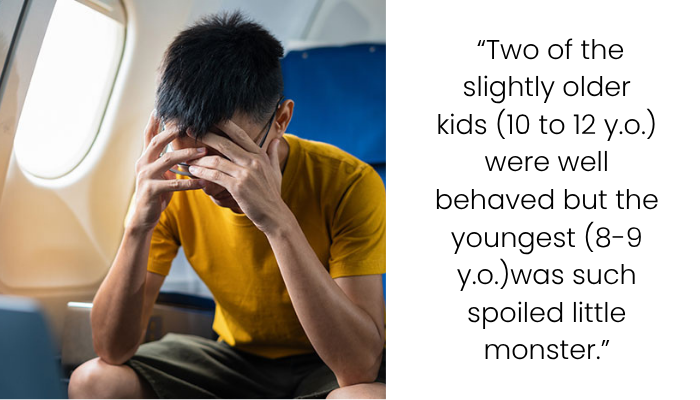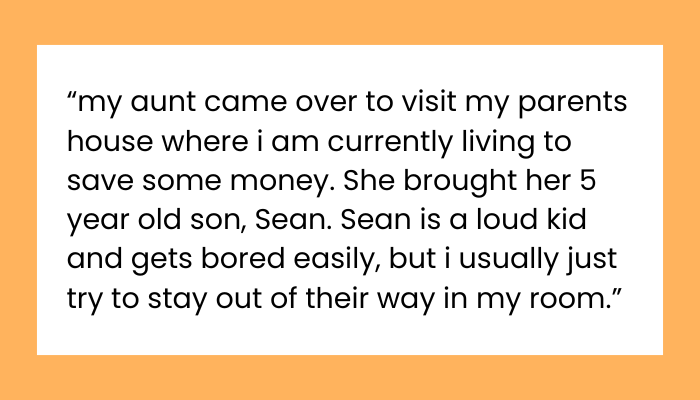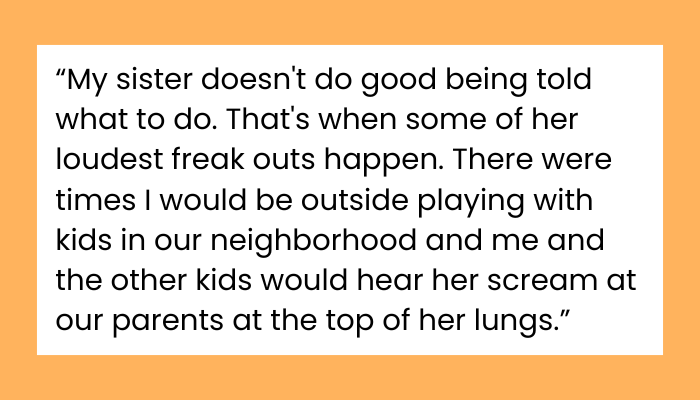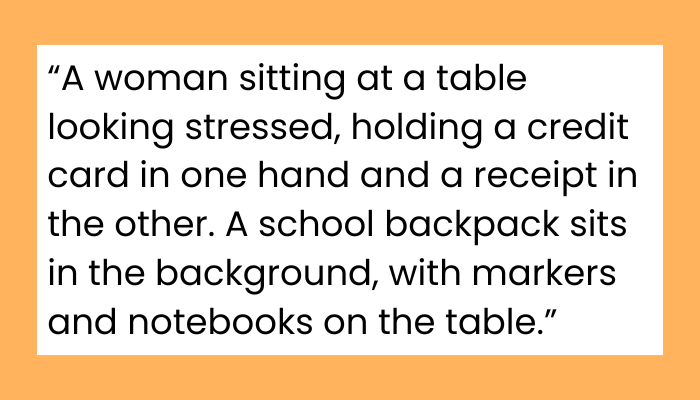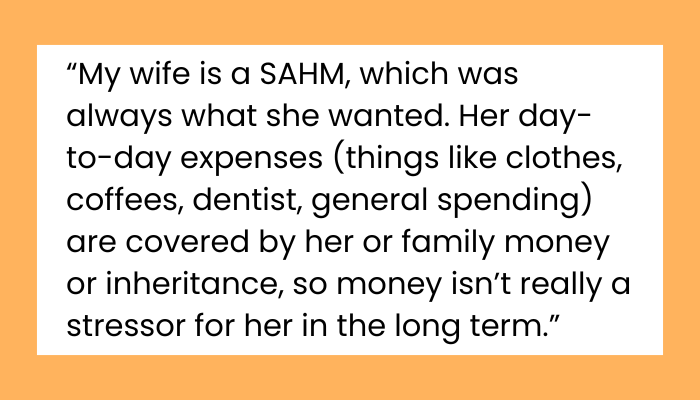Man Tells Rowdy Kid to “Shut Up” on Plane, Leaves Mom Fuming
Here’s a classic case of in-flight frustration taken to its limit. OP and his wife were seated behind a trio of kids, accompanied by their mom sitting parallel to them on a recent flight. While two of the children were chill, the youngest (estimated between 8-9 years old, later possibly re-evaluated as 4) was having what can only be described as a non-stop tantrum fest — screaming, kicking the seats, ignoring his mother, and doing everything short of summoning gremlins on the wing.
OP tried to keep his cool — headphones on, silent glances at his wife — but once they landed and the chaos continued, he snapped and said what many passengers have only fantasized about:
“Yo kid, you need to shut up.”
The kid immediately quieted down. The mom hit him with the classic “He’s just a kid” — twice. Meanwhile, even the child’s own sibling offered a kind of comic commentary:
“He’s not wrong, but not exactly right.”
Now OP wonders: Was he the jerk for addressing the child directly, or was it fair to finally say something when a parent couldn’t get control?
Let’s unpack what went down — and whether OP truly crossed a line.
Sometimes passengers manage to be louder than the multiple jet engines on a plane
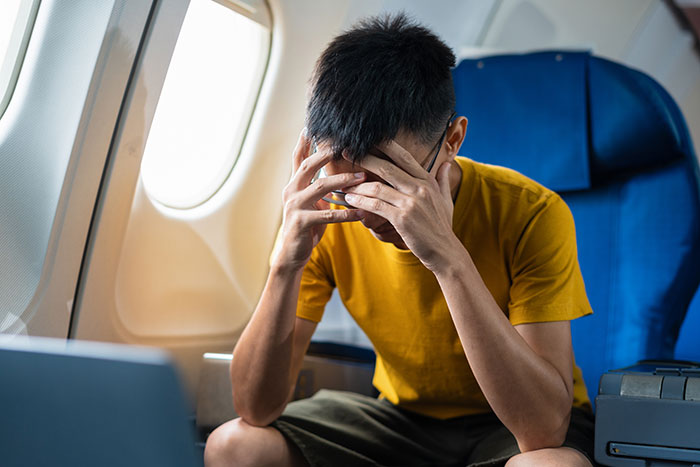
So one man had enough and he decided to tell a child to just shut up









This one hits a nerve for a lot of people. Air travel is already stressful. Add in loud kids, long taxi times, and ineffective parenting? That can be enough to send even the calmest traveler over the edge.

Let’s break this down — in simple terms — by looking at the roles of parents, passengers, and public expectations.
1. Parenting vs. Public Spaces: Who’s Responsible?
Parents are responsible for managing their kids. Period. Especially in confined public spaces like a plane. No one expects a 4-year-old to behave like a little monk — but we do expect parents to try. The issue here isn’t just the noise, it’s the lack of visible control. OP clearly saw the mom trying, but not succeeding.
Here’s the key: If your kid can’t stop kicking someone’s seat, yelling loudly, or throwing a full tantrum in public… you either step in or expect others might.
There’s a difference between a fussy child and a full-on disruption. From OP’s account, this wasn’t a restless toddler crying out of fear — it was a kid who was yelling demands, ignoring instructions, and treating the cabin like his personal living room.
2. Age Matters (But Not As Much As Behavior)
OP originally thought the child was around 8–9. His wife later said the boy looked closer to 4. That matters — a little. A younger child does earn more leeway, especially if they’re neurodivergent or overwhelmed.
But here’s the truth: age is just part of the story. The intensity and duration of the behavior matters more than the exact number on a birthday cake.
If a 4-year-old is loud for 10 minutes? That’s life. If a 4-year-old is screaming, kicking, and melting down for an entire hour-plus flight — and nothing changes — people will understandably get fed up.
3. Was “Shut Up” Too Harsh?
Okay, so here’s where things split. A lot of people agree the sentiment is valid — but the wording could be softer.
Telling a kid to “shut up” hits different. It’s blunt. It’s direct. It’s not exactly gentle parenting.
That said? In this situation, with multiple people suffering through non-stop chaos, it’s not some moral crime either. And it worked.
A better approach might have been:
- “Hey buddy, it’s really loud — can you quiet down?”
- “Hey champ, let’s give everyone a break from the noise, okay?”
But let’s be honest — OP wasn’t aiming for therapeutic language. He was exhausted, annoyed, and at his limit. His tone reflects that. Does it make him an A-hole? Not really. Maybe just a blunt tired traveler.
4. Where Was the Flight Crew?
On many airlines, it’s against policy for kids to be out of their seats during takeoff and landing. If this child was refusing to stay buckled or physically disruptive, the crew should’ve intervened. That’s what flight attendants are trained to do — not just serve drinks, but ensure compliance and safety.
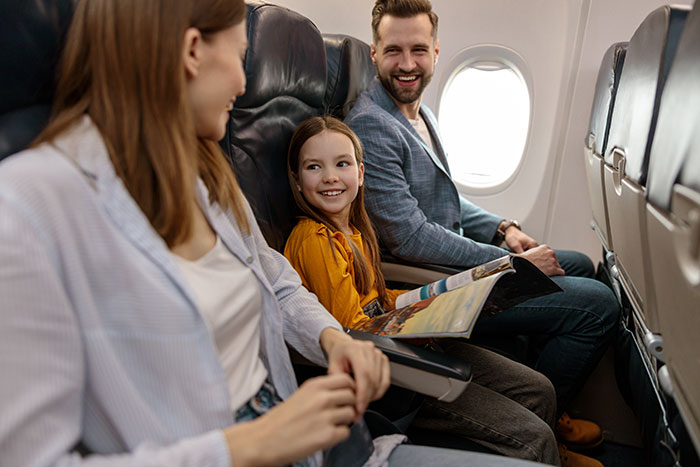
The fact that the child was unrestrained or excessively loud during these critical times also suggests a lack of enforcement, which only puts more pressure on nearby passengers to step in — which OP eventually did.
5. When Is It Okay to Say Something?
Let’s be clear: strangers shouldn’t police parenting unless someone is unsafe or severely disruptive. But here are some examples where saying something is fair game:
- A child repeatedly kicks your seat for more than a few minutes.
- A kid is screaming nonstop and the parent is either doing nothing or losing control.
- You’ve tried passive tolerance — headphones, ignoring, deep sighs — and the behavior continues.
In those moments, tone matters. A firm but respectful “Hey, could you help your child stop kicking?” or even “Hey buddy, it’s getting a little loud, can you take it down?” can go a long way.
Still, OP’s phrasing — “Yo kid, you need to shut up” — while not gentle, didn’t involve swearing, aggression, or threats. It wasn’t ideal. But it wasn’t unhinged either.
6. The Sibling’s Reaction: A Telling Sign
Maybe the most revealing moment? The brother who said:
“He’s not wrong, but not exactly right.”
That’s kind of the whole situation in a nutshell. You might not have been polite, but you weren’t wrong. Even the kid’s own family was fed up — and that says a lot.
The man chatted with some of the readers in the comment








So are you the A-hole for telling the kid to shut up?
Nope. Not the A-hole.
You lost patience after repeated disruptions, tried to keep cool until the very end, and only snapped after tolerating more than most would. Your comment was blunt, but the kid stopped — and that suggests someone finally drew a line he understood.
Parenting is hard. Flying with kids is harder. But that doesn’t mean the rest of the plane needs to suffer for hours because one child can’t be managed. OP may not have used the softest words, but when pushed to the limit, he did what a lot of passengers only dream of doing.
If anything, maybe airlines need a special section for families with small kids — not to isolate them, but to give everyone breathing room. Until then, patience is golden… but so is silence at 30,000 feet.
Want help drafting a response for the mom if she ever messages you about it? Or tips on setting polite in-flight boundaries? Just say the word.

